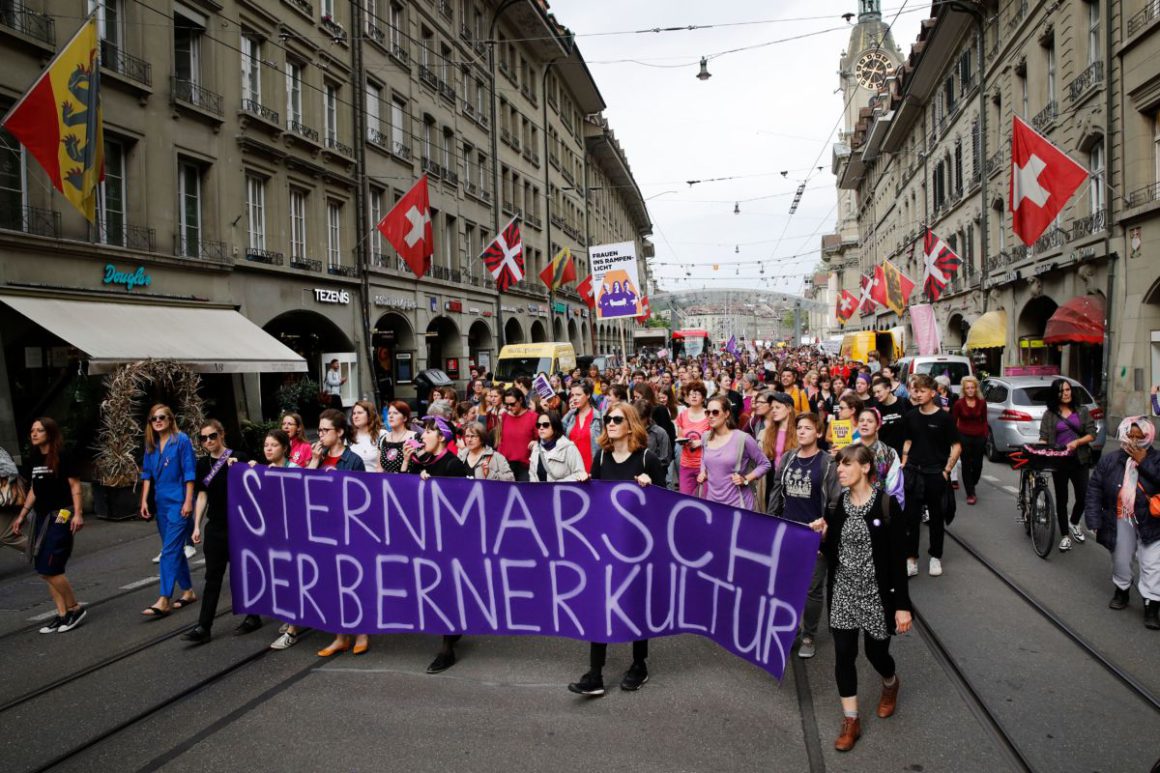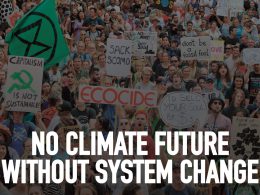The elections to the Federal Parliament in Switzerland last weekend saw a breakthrough for the Greens; jumping to 13% of the vote and gaining 17 seats. They now hold 28 seats in the National Council (lower house) and have become, for the first time in their history, the 4th party largest party in Parliament.
The Greens made notable breakthroughs such as trebling their representation in Geneva, trebling their vote in Ticino, winning a seat in Valais for the first time, and winning seats in the Council of States (upper house) for the first time in many cantons.
The Liberal Greens (a right wing split from the Greens) also did well, going from 9 seats to 16 with 8% of the vote.
Role of movements
The election results have the imprint of the climate and women’s movements that have erupted in Switzerland in the last year.
100,000 marched in September and similarly large protests led by school students and young people took place in the spring. As well as the large protests there have also been thousands getting active with localised protests and actions.
Last June 500,000 took part in an historic ‘Women’s Strike’ in what was the largest protest in the country’s recent history. (see previous report; ‘500,000 on the Streets in Swiss “Women’s Strike” – Solidarity & Struggle is Powerful’).
Both the climate movement and the women’s strike have been inspired by international events and have demonstrated the willingness of workers and young people to get active in a struggle for a different society. Many getting active in protest and politics for the first time.
The movements have also popularised the idea of strike action as a method that can force change and push for demands that will benefit the working class as a whole.
Although anti-capitalist and even socialist ideas have definite support and a huge openness to these ideas exist in these movements, and despite the huge efforts invested by those active in the movements, a clear political lead has not yet emerged.
However, despite the lack of a lead to build on these movements. These movements played a role in these elections with issues such as climate change, inequality, pay and pensions becoming more prominent; pushing back the racist and far right.
In a recent poll ahead of election day 27% cited climate change as a determining issue in their decision to vote, 21% cited the cost of compulsory health assurance while immigration fell to 19%.
The backbone of the women’s strike and the climate movement has been the thousands of young people and workers who organised actions, however due to the lack of an organised political expression, the Greens have been able to tap these sentiments in society. It is also the case that the Greens consciously tried to put themselves at the head of the movements on climate and in the women’s strike.
An exit poll has shown that one in five young people voted for the Greens, and one in three when you include the Liberal Greens. The Greens also gained 28% of their support from people who abstained in the previous election.
Limitations of the greens
The Greens have made sounds about the need to hold the financial sector to account, with their President Regula Rytz stating that they want a Swiss financial sector that “(does) not invest any longer in coal or fossil energy”.
For Swiss financial capital to disinvest from fossil fuels it would entail a massive write down of wealth of one of Europe’s core financial centres. This will not be done voluntarily by the capitalist class.
To implement real change that would be in line with the expectations of the climate movement, it requires a breaking with the capitalist market and private ownership of the wealth by the bosses.
However, the Greens are tied to pro market policies and have played their part, alongside the likes of the Social Democratic Party (SP/PS) in implementing cuts and privatisation at local and canton level.
There is now a discussion about altering the traditional ‘magic formula’ power sharing arrangement to bring the Greens into the Federal Council (government), which is made up of 7 ministers from the same 4 political parties. The vice-president of the Greens, Lisa Mazzone, is reported as stating that “We have every intention of being a force in government”.
However, the Greens will not challenge capitalism. They will be tested in their new position, especially if they enter government, and they will be found wanting.
Fall back for the right
The right suffered a setback in these elections. Every traditional party lost in these elections: Liberals/Radicals (FDP/PLR), Christian Democrats (CVP/PDC) and Social Democrats; but it’s the right populist SVP/UDC who lost the most – 12 seats. They still remain the biggest party by seats, a position they that they have had since the 2003 elections, and strongly increased it in 2015.
They campaigned with openly vile racist rhetoric, including a poster promising to ‘Defend Switzerland and protect the Swiss’ from ‘insecurity, rapes and aggression’ while featuring cartoon images of a bearded middle eastern man, a Eurocrat and Greta Thunberg!
The right populist Geneva based party, Citizens’ Movement Geneva (MCG), lost their seat in parliament and La Lega who are based in the Italian-speaking Ticino canton lost a seat and now have 1 seat in parliament.
The far-right and right populism, despite losing some ground in this election, remains a threat. The SVP/UDC still remains the largest party in the parliament. Although they do get support from a reactionary core, they owe much of their electoral success on exploiting people’s opposition to the political establishment and fears about economic security. The SP/PS and the Greens have been incapable of cutting across the SVP/UDC in a decisive way as they have implemented cuts and austerity measures and are unable to answer people’s fears. The only way to really cut across the far right is through a united workers’ movement that unites all workers regardless of their background and is armed with a strong left fighting alternative.
Such a movement in a ballot initiative – initiated by the SVP/UDC to attack the right of immigrants and due to be voted on in May – would defend the rights of immigrants while challenging the ‘race to the bottom’, austerity and job insecurity, and putting forward a socialist and internationalist opposition to the EU.
Economic clouds ahead
Although the Swiss ruling class may be the envy of capitalist classes across the globe for its relatively low unemployment, low state debt and relative political stability; any sense that Switzerland is an exception is very superficial. Switzerland is not immune from global economic and political developments; the reality is that there are clouds on the horizon for Swiss capitalism.
Swiss capitalism is dependent on export-led growth and is already being negatively impacted by global trade disputes and the process of deglobalisation. Impacted by a slowdown in Germany and elsewhere, the Swiss economy has been stagnating. Investment is falling and there has been negative growth in the last two quarters of 2018, and anaemic growth of just 0.4% in the first quarter of this year.
Swiss capitalism is also impacted by increasing uncertainty over the renegotiation of its bilateral treaties with the EU which have hit a logjam, with the EU pushing for greater liberalisation of the ecnomy and less protections for workers’ rights.
There is low unemployment of just 2.3%, however, it masks growing precarity and large level of part time work, especially among young people.
As in the rest of Europe, the conditions of workers in Switzerland came under attack in the great recession and met resistance, seen for example in the public sector strikes in Geneva and opposition to attacks on pension rights.
The pending crisis will see pressure being put again on workers and public services which will bring opportunities for movements to develop. It is essential that the union movement seizes these opportunities.
Potential for the left
Although it is not getting many headlines in the media, the left scored positive results in these elections, and apart from the Greens and Liberal Greens were the only political forces to make gains.
In Geneva, SolidaritéS won a seat in National Council as part of ‘Ensemble à Gauche’ which claimed 7.2% of the votes in the canton. It is 12 years since they last held this seat. The Swiss Party of Labour (PST-POP/PdA) also maintained their seat in Neuchâtel, increasing their vote and scoring 14.1% there. ‘Ensemble à Gauche’ also increased their vote in Vaud with 4.1% but fell short of a seat.
These seats in the National Council are an important gain. They can be used now to give voice to workers at a federal level and give a political voice to the tens of thousands of workers and young people getting active in movements. They can also be used to assist in linking up these movements with the those who will be seeking to defend their jobs, pay, conditions and public services in the coming period. The positions can also be used to assist in putting forward a clear strategy for these movements to win victories, including through organising strike action and political initiatives.
It is key also that a clear socialist alternative, that breaks with the capitalist market and satisfies all the needs of workers, ends inequality and ensures just action on climate change in built.












